If you’re a new player wanting to get started with pickleball, there’s a lot to take in. But one of the first things to consider is the way you hold the paddle. This guide has you covered!

When it comes to learning pickleball, one of the first things you should master is how to hold the paddle. Yeah, it sounds basic, right? But here’s the thing: the way you hold the paddle dictates all the different shots you can make!
Experience Pickleball covers everything you need to know to get started, whether you’re a complete beginner or you’re looking to get an edge over your buddies before the next game.
Get all the details at https://experiencepickleball.com/
Experience Pickleball offers a variety of articles on shot strategies, but paddle technique is the foundational element upon which each specific shot is built. If you're a new player, you should use a ‘continental grip’ to begin with because this is one of the easiest to grasp, the guide notes - advising holding the paddle as if you intend to ‘shake hands’ with it.
As the fastest-growing sport in America according to a recent CNN article, pickleball combines elements of tennis, badminton, and ping-pong. With growing interest, many new players are looking for resources to help them pick up the game more quickly.
The new guide provides recommendations on several standard grips for you to try, explaining when each is most applicable. For example, neutral grips that evenly distribute weight across the paddle face, like the continental grip, are ideal for smooth forehand and backhand volleys near the net. Meanwhile, for serves and groundstrokes from the baseline, the guide explores strong and weak grips to generate more power or finesse respectively.
The guide details how during a weak grip, the ‘V’ created by the space between your thumb and index finger points left, while in a strong grip, it points to the right instead. Understanding grip nuances takes practice, as the angle of the paddle in your hand impacts shot control, and developing muscle memory around hand placement and paddle orientation early on can pay dividends in the future.
The guide also emphasizes the importance of neutral paddle positioning, keeping the blade perpendicular to the playing surface before contact. However, exceptions emerge when near the net, where you should prepare for potential overhead smash returns.
Damien Dansel, the guide’s author, has six years of experience playing the sport and is keen to bring the game to a wider audience. He states: “Holding your pickleball paddle is more about getting the grip right than it is about positioning. Many players come from different backgrounds, so you may find yourself shifting to a natural position that works for you.”
Read the full guide today and you’ll be well on your way to getting started!
Check out https://experiencepickleball.com/how-to-hold-a-pickleball-paddle/ for any extra info you need!
